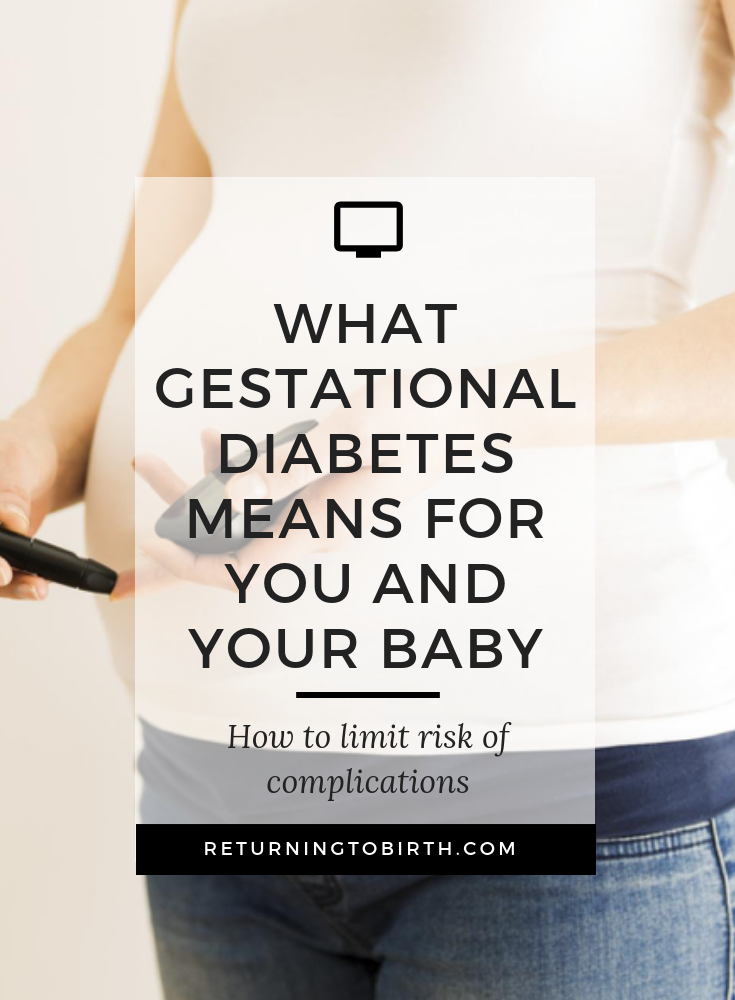What Gestational Diabetes Means for You and Your Baby
Pregnancy can be a wonderful experience, but sometimes problems occur. For example, some women develop gestational diabetes. For health issues like gestational diabetes (GD), it’s important to know what effects it could have on you and your baby. Here are some things you should know about gestational diabetes.
Increased Risk for Developing Diabetes
Were you diagnosed with gestational diabetes? While is does potentially increase your chances of some complications, well controlled gestational diabetes usually doesn’t cause too many problems. It also doesn’t mean you have to have a c-section! Learn how to lower your risks and stay healthy. #childbirth #pregnancy #gestationaldiabetes
Diabetes can be scary, but being diagnosed with GD can be more so with the added worry of your baby's health. Diabetes can be controlled with diet, exercise and sometimes medication.
Now more than ever, it is important to eat healthily and follow your doctor's suggestions for keeping yourself and your baby safe. Gestational diabetes brings the potential for you to continue to carry the diagnosis of type 2 diabetes after pregnancy. It also increases the risk for your baby to develop the same diagnosis, and girls can be at higher risk for gestational diabetes.
During a regular pregnancy, it is important to monitor your eating habits and have your blood sugar checked on a regular basis. If you are diagnosed with GD, it is even more important to check sugar levels to make sure they are staying within treatable limits.
Were you diagnosed with gestational diabetes? While is does potentially increase your chances of some complications, well controlled gestational diabetes usually doesn’t cause too many problems. It also doesn’t mean you have to have a c-section! Learn how to lower your risks and stay healthy. #childbirth #pregnancy #gestationaldiabetes
Symptoms
You Might Have a Big Baby
Women who are diagnosed with GD may give birth to bigger babies. The average weight for a full-term baby is approximately seven pounds. A baby born to a mother with uncontrolled GD could weigh 9 pounds or more. Vaginal delivery of a large baby can sometimes result in birth injuries, such as shoulder dystocia, one of a few types of brachial plexus injuries.
Depending on your risk factors, some doctors may recommend a c-section delivery if you have uncontrolled GD. If you want to avoid a c-section delivery, keeping your blood sugar in check and focusing on healthy diet and exercise can help. Hormones released by the placenta affect your insulin levels, and they are instrumental in fetal growth and birth weight of your baby.
Were you diagnosed with gestational diabetes? While is does potentially increase your chances of some complications, well controlled gestational diabetes usually doesn’t cause too many problems. It also doesn’t mean you have to have a c-section! Learn how to lower your risks and stay healthy. #childbirth #pregnancy #gestationaldiabetes
When you are pregnant, your body is changing all the time. You could develop gestational diabetes but not necessarily notice anything too out of the ordinary. Some signs of GD are being more tired than usual and having to pee constantly. You could also be thirsty and/or have a dry mouth more than usual.
Some of these can also be regular symptoms of pregnancy, so it’s important for you to see a doctor regularly so they can help you to know if your symptoms are related to GD or not.
Risk Factors and Complications
Age and weight play a big part in the development of GD. Women who are older than 25 and overweight have the highest percentage of GD. Family history is a major factor as is being diagnosed with prediabetes.
As for complications, gestational diabetes can cause preeclampsia that can lead to a stroke. In addition to the risk of developing type 2 diabetes, a big baby has some added risk of weight problems throughout their life. There is also an increased risk of heart disease.
Pregnancy is an exciting experience, but it’s important to do everything you can to be healthy. Following a healthy diet and communicating with your doctor regularly throughout your pregnancy will help keep you and your baby safe and healthy.






